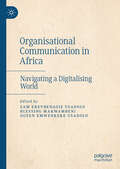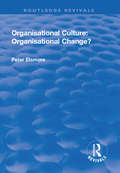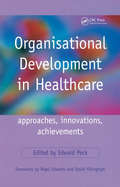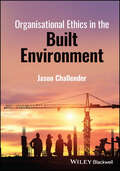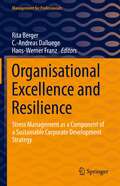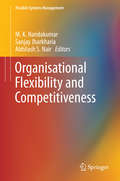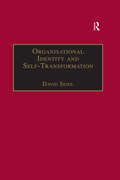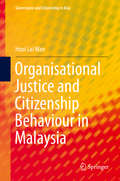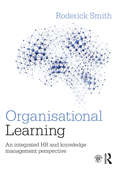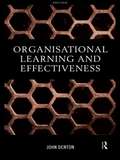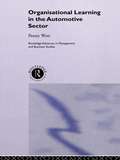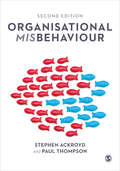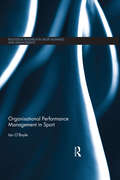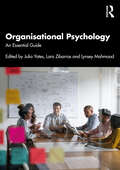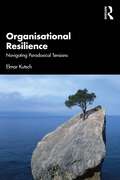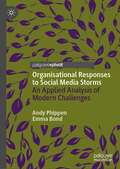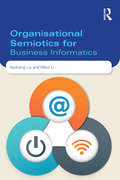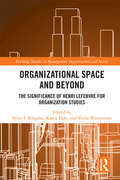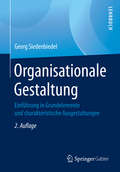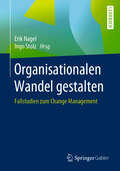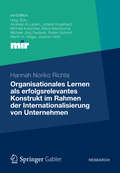- Table View
- List View
Organisational Communication in Africa: Navigating a Digitalising World
by Sam Erevbenagie Usadolo Blessing Makwambeni Queen Emwenkeke UsadoloThis book delves comprehensively into organisational communication in Africa in the digital age, alongside other organisational changes. This makes it a valuable resource for scholars, practitioners, and students in organisational communication, corporate communication, public relations, and development communication – both within Africa and across the globe. Through diverse perspectives and evidence-based insights, the book equips readers with the knowledge and tools needed to navigate the ever-changing organisational landscape and achieve success in our rapidly evolving world.
Organisational Culture: Organisational Change? (Routledge Revivals)
by Peter ElsmoreThis title was first published in 2001. When organizational change occurs, members of the organization can feel insecure in the face of a seemingly uncertain future. This work investigates the links between organizational culture and organizational change by looking at two businesses that have been privatized - British Gas and British Telecom - and the processes surrounding the ways these organizations changed in the mid 1990s. It includes interviews with middle-ranking and senior officals, illustrating that anguish is experienced not only by those on the lower rungs of the corporate ladder.
Organisational Development in Healthcare: Approaches, Innovations, Achievements
by Edward PeckOrganisational Development in Healthcare introduces the practical ways in which change in health services can be promoted. It includes descriptions of all of the most important approaches to change currently being used in the NHS, discussion of when they work best and details of the evidence of their impact.
Organisational Ethics in the Built Environment
by Jason ChallenderOrganisational Ethics in the Built Environment A comprehensive analysis of the critical role played by ethics in construction organisations, and a toolkit for implementing a strong ethical culture In Organisational Ethics in the Built Environment, accomplished construction leader Jason Challender delivers an insightful and important resource for construction industry professionals contributing to the creation of safe and suitable projects. The author explains how to construct the foundation for ethical building and business practices in the construction industry, and explores the methods, motives and rationales behind successful and ethical projects from an organisational and industry perspective. You’ll learn how practical improvements to organisational ethics can promote ethical standards, behaviours and practices and influence the success of projects in the built environment. You’ll also discover the importance of leadership, motivational management, human resource management, corporate responsibility and social value in encouraging strict compliance and adherence to ethical principles, values and standards within organisations. Readers will also find: A thorough introduction to the critical importance of trust, collaborative working and partnering arrangements in contemporary construction and engineering organisations Comprehensive explorations of the relevance of environmental ethics Practical discussions of how to link corporate policies and strategies to ethical guidelines Case studies from across a variety of knowledge fields, including manufacturing and retail Perfect for construction managers, Organisational Ethics in the Built Environment will also benefit undergraduate and postgraduate students of construction, business, management, engineering and other construction related subjects.
Organisational Excellence and Resilience: Stress Management as a Component of a Sustainable Corporate Development Strategy (Management for Professionals)
by Rita Berger C. Andreas Dalluege Hans-Werner FranzPersonal stress has an enormous impact on organizational and employee performance. This book introduces the web-based diagnostic tool IMPRESS, which provides employees, managers and HR professionals with information about potential stress factors. The book describes the underlying methodology for this integrated approach and presents the tools and learning modules to support the methodology. A series of case studies from pilot implementations in companies and universities illustrate the application of the approach in a variety of work environments. The book is based on an international research project for a holistic approach to stress prevention by combining Human Systems Audit with the European Excellence approach as promoted by the Common Assessment Framework (CAF) and the EFQM Excellence Model. This approach is intended to contribute to organizational development that supports effective employee stress management.
Organisational Flexibility and Competitiveness
by M. K. Nandakumar Sanjay Jharkharia Abhilash S. NairThe proposed book is intended to provide a conceptual framework of 'Organisational Flexibility and Competitiveness' supported by research studies in various types of flexibilities exhibited by an organisation. The need for enterprise flexibility in an era of rapidly advancing technology, increasing competition, and globalization, is apparent. Flexibility can be thought of as an ability of the enterprise to quickly and efficiently respond to market changes and to bring new products and services quickly to the market place. Beyond this definition, a truly flexible enterprise should proactively change the market through its ability to create truly new and innovative products and services. The book applies the concept of flexibility to various functional areas: strategy and competitiveness, organization and HR management, information systems, finance and risk management, operations and supply chain management.
Organisational Identity and Self-Transformation: An Autopoietic Perspective
by David SeidlDavid Seidl brings together two important issues in organization and management studies in this volume: the concept and related theory of organizational identity, and autopoietic organization theory (as originally developed by Niklas Luhmann). The contribution of the book is twofold: it provides an introduction to autopoietic organization theory and it provides a new perspective on organizational identity and self-transformation. Thus the book is relevant to both organization theorists interested in new approaches to organization and to researchers of organizational identity. The themes are reflected in the structure of the book. Chapters one and two provide an introduction to Niklas Luhmann's organization theory. Based on this, chapter three develops a new concept of organizational identity. In chapters four and five a theory of organizational self-transformation (i.e. change of identity) is developed.
Organisational Justice and Citizenship Behaviour in Malaysia
by Hooi Lai WanThis book presents the current state of knowledge concerning developments in organisational behaviour and human capital management in the new millennium. It features an in-depth study among managerial staff in the manufacturing sector in Malaysia to reflect employee perceptions of organisational justice, organisational citizenship behaviour, job satisfaction and manager-employee exchanges. Specifically, it seeks to establish the relationships between these constructs to better manage human capital. With globalisation and the increased career mobility of young talents, organisational citizenship behaviour is of paramount importance in order to retain these workers. The study's greatest contribution is its identification of key indicators that influence organisational citizenship behaviour. Knowing which type of organisational justice is salient for each construct allows the management to proactively improve conditions at the workplace. In essence, this book is intended to draw attention to those aspects of managing human capital that ought to receive the most attention, but are often overlooked in practice. In light of ongoing global challenges, it seeks to improve governance at the workplace. It offers a valuable resource for researchers and practitioners alike, as well as graduate students writing their dissertations.
Organisational Learning: An integrated HR and knowledge management perspective
by Roderick SmithOrganizational Learning: An Integrated HR and Knowledge Management Perspective draws on a broad and multi-disciplinary base to look at the origins and practice of organizational learning. It critically considers the nature of organizational knowledge as a social construct; pedagogical issues around learning as individuals, groups, teams and whole organisations; and technological issues around the development of knowledge-based information systems. Supporting case studies are provided throughout the book, and readers will also benefit from a companion website which expands on the key themes of the text. Organizational Learning will enable readers to develop and implement strategies for ensuring long-term access to the embedded knowledge and experience of an organization. This textbook will be invaluable reading for undergraduate and postgraduate students on organizational learning, HRM and knowledge management courses.
Organisational Learning and Effectiveness
by Denton JohnLearning is increasingly seen as crucial to the success of organisations but many studies of the subject offer very little empirical evidence to substantiate this. Based upon in-depth research, including over seventy interviews with managers and employees, Organisational Learning and Effectiveness is an original and comprehensive analysis of learning organisations. Contents include:* detailed case studies of five major international companies: Coca-Cola and Schweppes Beverages, 3M, Siebe, Mayflower and Morgan Crucible* the intellectual origins of organisational learning* best practice in organisational learning* the importance of leadership roles and skills*a critical examination of the usefulness and relevance of organisational learning and effectiveness.Integrating management theory and practice, this volume is an extremely valuable resource for all those with an interest in organisational behaviour and human resource development.
Organisational Learning in the Automotive Sector (Routledge Advances in Management and Business Studies #Vol. 14)
by Dr Penny West Penny WestThis book considers the concepts of organisational learning and the learning organisation, and critically examines their take up within the context of four contemporary work organisations in the European automotive sector. Within this dynamic environment, the pursuit and implementation of approaches that encourage individuals to learn and challenge existing orthodoxy are now dominant on the management agenda. Changes to processes, structures, cultures and the employment relationship per se.
Organisational Misbehaviour
by Paul Thompson Stephen AckroydMisbehaviour at work has traditionally focused on work limitation, pilferage, absenteeism and sabotage. These remain important, but the organisational landscape is changing. From new forms of satirical humour and use of social media, workplace bullying and sexual misconduct, to managerial misbehaviour and its consequences, the second edition of Organisational Misbehaviour explores the latest forms of organisational subversion and offers fresh insights into the underlying dynamics of management and organisational processes. Drawing from contemporary research, this authoritative text is suitable for anyone interested in the study of management, work and organisations. Stephen Ackroyd is Emeritus Professor at the Management School of Lancaster University, UK. Paul Thompson is Emeritus Professor of Employment Studies at the University of Stirling, UK.
Organisational Misbehaviour
by Paul Thompson Stephen AckroydMisbehaviour at work has traditionally focused on work limitation, pilferage, absenteeism and sabotage. These remain important, but the organisational landscape is changing. From new forms of satirical humour and use of social media, workplace bullying and sexual misconduct, to managerial misbehaviour and its consequences, the second edition of Organisational Misbehaviour explores the latest forms of organisational subversion and offers fresh insights into the underlying dynamics of management and organisational processes. Drawing from contemporary research, this authoritative text is suitable for anyone interested in the study of management, work and organisations. Stephen Ackroyd is Emeritus Professor at the Management School of Lancaster University, UK. Paul Thompson is Emeritus Professor of Employment Studies at the University of Stirling, UK.
Organisational Performance Management in Sport (Routledge Research in Sport Business and Management)
by Ian O'BoyleEffective performance management systems are essential in any successful organisation. In both commercial sport business and not-for-profit sport organisations, the pressure to follow international best practice in performance management has grown significantly in recent years. Organisational Performance Management in Sport is the first book to show how performance management concepts, tools and principles can be applied in the modern sport environment. Linking theory and practice throughout, the book defines fundamental performance parameters impacting on sport organisations, and introduces key issues such as individual performance management through to board-level governance structures, presenting extended real-world case studies and practitioner perspectives. As such, it offers the most clear and complete outline of performance management in sport organisations available. With case studies, insight boxes and industry examples integrated throughout the text, Organisational Performance Management in Sport offers accessible and vital reading for all sport management students, researchers and professionals with an interest in this important area of sport management research and practice.
Organisational Psychology: An Essential Guide
by Julia Yates Lara Zibarras Lynsey MahmoodOrganisational Psychology offers an accessible, engaging and practical introduction to this fascinating discipline. It explores the latest thinking, reveals surprising truths about the way we work, and explains how to craft a successful and fulfilling career in the field. Organisational psychology is a complex and dynamic field that focuses on human behaviour in the workplace, and explores how individuals, groups and organisations function. Structured in three parts, the book combines an overview of the field with effective advice on how to become a successful organisational psychologist. It offers a deep-dive into the British Psychological Society’s five core areas of organisational psychology: Psychological Assessment at Work; Learning, Training and Development; Leadership, Engagement and Motivation; Well-being and Work; and Work Design, Organisational Change and Development. Chapters include key academic and theoretical concepts, practical applications, future directions for the field, key learning points, and further reading. Written by highly qualified experts in the field, this text is ideal for both undergraduate and postgraduate students taking programmes or modules in organisational psychology or related topics, including work and business psychology and human resources, as well as human resources practitioners. This text will also be valuable for anyone interested in understanding how organisations function and the best ways to allow individuals and organisations to survive, thrive and flourish.
Organisational Resilience: Navigating Paradoxical Tensions
by Elmar KutschThis book provides a guide to navigating the paradoxical tensions of organisational resilience and presents a framework to aid individuals and businesses to become more open-minded, flexible, and mindful in managing the unexpected. The book offers the reader pragmatic and insightful means to achieve a ‘state’ of organisational resilience, making use of current research data that shows how managers anticipate and respond to actual and near-miss incidents. Grounded in the day-to-day reality of managers, the goal of this book is to offer a unique theoretical framework as a platform for practical application for the improvement of organisational outcomes. It provides insights into ten key capabilities that enable the reader to set up a successful program of organisational resilience, taking a cross-cutting approach and focusing on implementation while having solid foundations in theory. This is an ideal book for advanced students and executive education courses in risk management, crisis management, and business continuity, as well as thoughtful practitioners.
Organisational Responses to Social Media Storms: An Applied Analysis of Modern Challenges
by Andy Phippen Emma BondThis book explores the growing phenomenon of the social media storm in the context of educational establishments. With a methodological approach that draws on aspects of virtual and offline ethnography, the text presents a series of case studies of public online risk-related incidents. Our ethnographic methodology adopts the use of unobtrusive data collection approaches, to explore publicly available data from online interactive behaviours. Drawing on a range of methods from internet mediated research (IMR) to inform our ethnographic account, the book provides an in-depth exploration of the public and organisational discourses arising from four short, clear high-profile internet risk case studies in the education sector ranging from early year to higher education. It considers the social construction of a new ‘risk’ culture arising computer-mediated social interactions and its impact on, and response by, the organisations and society.
Organisational Schizophrenia
by Gopal K GurejaMore than two decades after the watershed economic reforms of 1991, customers find yawning gaps between what many companies promise to deliver as a matter of policy and what, in customers' perception, is actually delivered at the operating level. A major part of the problem stems from the fact that while a company may be keen to maximise customer satisfaction, it would also want to maximise shareholder value at the same time. This obsessive pursuit kills people`s objectivity. The resulting conflict of self-interest generates wrong signals within the company, leading to organisational schizophrenia severely affecting employees' emotional engagement. Supported by sizeable empirical research from 300 interviews with almost 200 respondents, including customer-contact employees, the book explores the reasons why, in a company, - behaviour becomes unpredictable, - responsiveness becomes arbitrary, - initiative becomes risky, - operating practices drift away from policy and - mission statements begin to turn into mere posters. The book shows how organisational schizophrenia and the consequent problems can be avoided through disciplined and rigorous commitment to core values, standing up to wrongdoing, and taking a stand for the customer at all levels of management.
Organisational Semiotics for Business Informatics
by Kecheng Liu Weizi LiDrawing meaningful conclusions from organisational data is challenging, and theoretical frameworks can often illuminate information in fresh and useful ways. This book is one of the first to demonstrate how organisational semiotics can be applied to business informatics and information systems. Semiotics, a long-established discipline of signs, offers a rich philosophical and theoretical foundation for understanding information systems. This book demonstrates how applying the framework of semiotics to an organisation can provide insights into its communication needs, and as a result, enhance the design of its information system. The authors demonstrate how organisations collect, process, represent, store and consume information through a complex system which is aligned to support its objectives and enhance performance. Organisational Semiotics for Business Informatics clearly introduces the basic principles and describes a set of methods and techniques rooted in organisational semiotics. These have been applied to business applications; demonstrated through real life case studies. This ground-breaking book has the potential to transform the theoretical understanding of information systems into the basis of a scientific discipline.
Organisational Space and Beyond: The Significance of Henri Lefebvre for Organisation Studies (Routledge Studies in Management, Organizations and Society)
by Karen Dale Sytze F. Kingma Varda WassermanThrough the focus on organizational space, using the reception and significance of the seminal work on the subject by sociologist Henri Lefebvre, this book demonstrates why and how Lefebvre's work can be used to inform and elaborate organisational studies, especially in view of the current interest in the "socio-material" dimension of organisations. As the "spatial turn" in organisational research exposed the importance of spatial design in inducing power and cultural relations, Lefebvre's perspective has become an inspiring, theoretical framework. However, Organisational Space and Beyond explores how Lefebvre’s work could be of a much wider relevance, especially given his profound theoretical engagement with diverse schools of philosophical and sociological thought, including Nietzsche, Marx, Sartre and Foucault. This book brings together a range of authors that collectively develop a broader understanding of Lefebvre's relevance to organizational studies, including areas of management concern such as strategy and diversity studies, and ultimately draw on Lefebvre’s work to rethink, reimagine and reshape scholarship in organisational studies. It will be of relevance to researchers, academics, students and organizational professionals in the fields of organisation studies, management studies, cultural studies, architecture and sociology.
Organisationale Gestaltung: Einführung in Grundelemente und charakteristische Ausgestaltungen
by Georg SiedenbiedelDieses Lehrbuch stellt grundlegende Formen der organisationalen Gestaltung dar und illustriert diese anhand von praktischen Beispielen. Als Kernelemente betrachtet Georg Siedenbiedel insbesondere die Entwicklung der Organisationstheorie, die Gestaltung formaler organisatorischer Strukturen, das Prozessmanagement, die Virtualisierung von Organisationen, das Projektmanagement sowie den organisationalen Wandel. Er spannt so den Bogen von der Entstehung der unterschiedlichen Organisationsansätze, deren Grundlagen und Zielen bis hin zu modernen Entwicklungsformen wie der virtuellen Organisation und dynamischen Organisationsentwicklungen. Zahlreiche Grafiken und Übersichten sowie Merksätze und Definitionen erleichtern das Verständnis und die Umsetzung in die Praxis.
Organisationale Machtbeziehungen im Wandel: Führung zwischen Zustimmung und Zwang
by Olaf Geramanis Stefan Hutmacher Lukas WalserDieses Fachbuch beschreibt mit seiner interdisziplinären Ausrichtung die Machtbeziehungen in Organisationen aus mehreren Blickwinkeln. Die Autoren untersuchen das Spannungsverhältnis zwischen klassischen Strukturen und Bedingungen auf der einen und einer eher diffusen Handlungs- und Gestaltungsmacht auf der anderen Seite. Dabei gehen Sie den Fragen nach, ob aktuell Veränderungen von Machtbeziehungen in Organisationen stattfinden und welcher Art diese sind bzw. welche Auswirkungen sie haben. Wie gehen Führende mit den Herausforderungen einer sich verändernden Welt um und welche machtdynamischen Folgen können sich daraus entwickeln? Wo sind möglicherweise Schwachstellen im Machtgefüge innerhalb einer Organisation und wie kann mit Ambivalenzen und Machtverschiebungen aufgrund sozialer und technischer Veränderungen umgegangen werden? Es wird deutlich, dass Machtausübung zwar asymmetrisch ist, aber keineswegs etwas Einseitiges – Machtbeziehungen sind Austauschbeziehungen.Die Hochschule für Soziale Arbeit der Fachhochschule Nordwestschweiz unterstützte diesen Tagungsband.
Organisationale Spannungen und Paradoxien in radikal selbst organisierten Unternehmen
by Elsa BreitHeutzutage sind Unternehmen von sehr volatilen Umweltbedingungen umgeben. Um auf diese adäquat reagieren zu können, arbeiten einige Pioniere radikal selbst organisiert mit Organisationsformen wie Holakratie und Soziokratie Bei radikaler Selbstorganisation wird Autorität formal und organisationsweit an die Mitarbeitenden übertragen. Elsa Breit untersucht in diesem Buch, welche organisationalen Spannungen und Paradoxien bei der Transformation hin zu radikaler Selbstorganisation auftreten, wie Unternehmen mit diesen umgehen und zu welchen Auswirkungen separierende und integrierende Ansätze führen. Dazu untersucht sie zwei holakratisch organisierte Unternehmen empirisch in den Spannungsfeldern Lernen, Organisation, Handlungsfähigkeit, Macht und Leistung. Der Paradoxie „Lerne Fremdorganisation, um selbst organisiert zu sein“ kann beispielweise durch intensives Training für Mitarbeitende und Begleitung durch Coaches begegnet werden. Elsa Breit zeigt mit ihrer Forschung, dass bei einer Integration von Paradoxien mit einer Sowohl-als-auch-Strategie positive Kreisläufe der Selbstorganisation und -verantwortung, Entwicklung von Rollen und Kreisen zur Anpassung an Umweltbedingungen, Spannungsverarbeitung und damit Komplexitätsbewältigung und Mitarbeiterzufriedenheit eintreten können. Radikale Selbstorganisation in Verbindung mit paradoxem Denken, nachhaltigem Unternehmenszweck, verteiltem Eigentum hat außerdem großes Potential für nachhaltiges und demokratisches Wirtschaften.
Organisationalen Wandel gestalten: Fallstudien zum Change Management
by Erik Nagel Ingo StolzDieses Lehrbuch beinhaltet eine Zusammenstellung aktueller und repräsentativer Fallstudien für die Bearbeitung in Unterricht und Training. Im ersten Teil geben die Herausgeber eine differenzierte Anleitung für die Bearbeitung verhaltensorientierter Fallstudien zum Thema Wandel. Es folgen 15 Fallstudien, in denen verschiedene Wandelvorhaben aus Sicht der Beteiligten dargestellt werden. Die Bearbeitung dieser Case Studies ermöglicht es den Lernenden, die Wandelprozesse umfassend zu rekonstruieren und zu durchdringen. Aus didaktischen Gründen wurden die Fälle auf bestimmte Problemstellungen und Dynamiken zugespitzt und mit weiteren realistischen und situationsgerechten Elementen angereichert, um sie für die Bearbeitung besonders ergiebig zu machen. Am Ende jedes Falls finden sich Leitfragen, die zur Diskussion anregen.Auf diese Weise wird ein vertieftes Verständnis für die Phänomene des Wandels und den Umgang mit diesen im Organisationsalltag vermittelt.
Organisationales Lernen als erfolgsrelevantes Konstrukt im Rahmen der Internationalisierung von Unternehmen
by Hannah Noriko RichtaBei der Suche nach Zusammenhängen zwischen der Internationalisierung von Unternehmen und ihrem Erfolg wird zunehmend der Einfluss des Organisationalen Lernens deutlich. In bisherigen Untersuchungen bleibt aber offen, wie der Lernbegriff definiert wird und wer was auf welche Weise lernt. Die verschiedenen Studien kommen deshalb unter Berufung auf die gleichen theoretischen Fundamente zu unterschiedlichen Ergebnissen. Hannah Noriko Richta entwickelt auf der Basis einer Diskussion des Forschungsstandes ein geschlossenes Modell der Erfolgswirkung des Organisationalen Lernens im Rahmen der Internationalisierung und unterzieht es einem empirischen Test.
